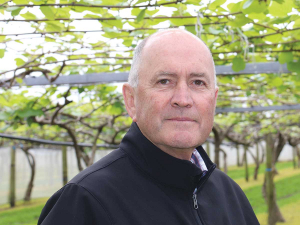Fruit fly discovery puts growers, exporters on edge
Fruit growers and exporters are worried following the discovery of a male Queensland fruit fly in Auckland this week.
 Hort NZ chair Barry O’Neil says the issues raised about RSE workers’ treatment are being blown out of all proportion.
Hort NZ chair Barry O’Neil says the issues raised about RSE workers’ treatment are being blown out of all proportion.
Horticulture NZ's chair has hit back at claims that the RSE workers are being treated like “slaves” and that the ill treatment of them is “systemic”.
Barry O’Neil, a kiwifruit grower since the 1980s, has worked for both MPI and Kiwifruit Vine Health. He says the issues raised are being blown out of all proportion.
“I reject a number of the accusations being made and am very concerned about suggestions that industry is not complying with the strict conditions laid down for the employment of RSE workers,” he told Rural News.
“I have yet to find accommodation that I would categorise in the bad territory.”
However, O’Neil does concede that in a scheme of 19,000 RSE workers there will be one or two individuals who will not meet the standards. But he says the Labour Inspectorate has been very quick to identify those who break the rules.
O’Neil adds that the RSE scheme is very hard to get into because of the strict compliance conditions that employers must meet.
Rural News was recently told by a major grower that the conditions are so strict and the cost of meeting these so high and time consuming that they avoid employing RSE workers where possible. Others have said that the problem is anything but systemic and that certain individuals are making accusations to benefit their own particular causes.
O’Neil points out in a number of cases the RSE workers themselves decide how many of them will be in a room. He says they come from environments where communal sleeping arrangements are common. “Often RSE workers prefer to be in rooms where there are others, rather than being on their own."
He adds that employers generally give RSE workers an opportunity to have a room of their own, but that they seldom take up this offer.
“We have got to remember that this scheme has been reviewed by the World Bank and judged as the best mobility seasonal labour scheme in the world,” O’Neil says.
Legal controls on the movement of fruits and vegetables are now in place in Auckland’s Mt Roskill suburb, says Biosecurity New Zealand Commissioner North Mike Inglis.
Arable growers worried that some weeds in their crops may have developed herbicide resistance can now get the suspected plants tested for free.
Fruit growers and exporters are worried following the discovery of a male Queensland fruit fly in Auckland this week.
Dairy prices have jumped in the overnight Global Dairy Trade (GDT) auction, breaking a five-month negative streak.
Alliance Group chief executive Willie Wiese is leaving the company after three years in the role.
A booklet produced in 2025 by the Rotoiti 15 trust, Department of Conservation and Scion – now part of the Bioeconomy Science Institute – aims to help people identify insect pests and diseases.